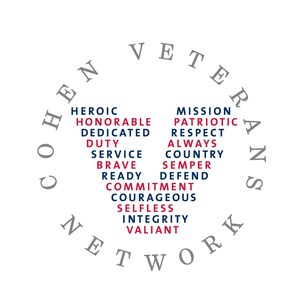From Symptoms to Treatment, New Survey Reveals Americans' Strong Misconceptions About PTSD
Two-Thirds (67%) of Americans believe the Majority of Veterans Experience PTSD
One in Four (26%) Americans believe the Majority of People with PTSD are Violent/Dangerous
Nearly One in Four (23%) Americans believe PTSD is Not Treatable
Additionally, two-thirds (65%) of Americans who have been diagnosed with PTSD say that civil unrest, political polarization, & isolation created by the COVID-19 pandemic over the past year has negatively impacted their recovery
STAMFORD, Conn., June 3, 2021 /PRNewswire/ -- Today, Cohen Veterans Network (CVN), a not-for-profit philanthropic organization that serves post-9/11 veterans, military families and active duty service members through a nationwide system of mental health clinics, revealed findings of its America's Mental Health PTSD Pulse Survey, which looked at Americans' general knowledge and understanding of Post-Traumatic Stress Disorder (PTSD). June marks PTSD Awareness Month intended to raise public awareness and reduce the stigma associated with the disorder.
PTSD is a mental health problem that some people develop after experiencing or witnessing a life-threatening event, like combat, a natural disaster, a car accident, or sexual assault. "A lack of understanding feeds into the stigma associated with mental health challenges such as PTSD, which can deter people from seeking care," said Cohen Veterans Network President and CEO Dr. Anthony Hassan. "As a means to address any misunderstandings that surround PTSD, we wanted to take a look at Americans' perceptions of the disorder. What we found is that there are strong misconceptions on everything from symptoms to treatments."
The survey of more than 2,000 U.S. adults and conducted by The Harris Poll, offers a broad overview of Americans' perceptions of PTSD. Key findings along with comparative facts include:
- Two-Thirds (67%) of Americans believe the majority of veterans experience PTSD, while three in four (74%) believe the majority of combat veterans experience PTSD
- FACT: PTSD impacts 11-20% of Iraq and Afghanistan War veterans, approximately 12% of Gulf War veterans, and 15% of Vietnam veterans.
- One in four (26%) Americans believe the majority of people with PTSD are violent/dangerous
- FACT: People with PTSD are not dangerous. Although PTSD is associated with an increased risk of violence, the majority of veterans and non-veterans with PTSD have never engaged in violence.
- Nearly one in four (23%) Americans believe PTSD is not treatable
- FACT: PTSD is treatable. There are multiple treatment options that have been proven effective for treating PTSD. These include Prolonged Exposure Therapy (PE) and Cognitive Processing Therapy (CPT), which are both research-supported, short-term effective therapies to address PTSD. PE helps you process traumatic events by gradual repeated exposure to trauma-related memories, emotions, and situations. While CPT targets ways of thinking that might keep you "stuck" in your PTSD. Many people who engage in treatment recover fully from PTSD.
- 40% of Americans believe that PTSD occurs immediately after a traumatic event
- FACT: PTSD symptoms often start within 3 months of the traumatic event, but sometimes emerge years later.
- Three in four (78%) Americans believe flashbacks are the most common symptom of PTSD, while 69% believe if you experience PTSD you will experience nightmares and 60% believe the majority of people who experience PTSD will experience hypervigilance
- FACT: Although many people with PTSD experience flashbacks, nightmares, and/or hypervigilance, PTSD can look different in different people. Other symptoms of PTSD include: intrusive memories of the traumatic experience, avoiding thoughts of the trauma or things that might remind you of it, exaggerated negative beliefs about yourself, loss of interest in things you normally enjoy, irritability, difficulty concentrating, and feeling detached or estranged from others.
- More than half (59%) of people believe that if you experience trauma you will develop PTSD
- FACT: The vast majority of people who experience a traumatic event do not develop PTSD. Approximately 50-60% of Americans experience at least one traumatic event during their lives, but only 7-8% ever experience PTSD.
- 40% of Americans don't know what PTSD stands for
- FACT: PTSD stands for Post-Traumatic Stress Disorder. Most people who go through a traumatic event experience some time of post-traumatic stress or difficult symptoms immediately afterwards, which typically resolve over time. This experience of post-traumatic stress becomes a diagnosable "disorder" if the symptoms don't go away or continue to get worse and interfere with one's daily functioning for an extended period.
"Cohen Veterans Network was founded on the notion of removing barriers to care," said Hassan. "The misconceptions that exist around PTSD are obstacles standing in the way of people receiving critical mental health care. We want to help educate the public on the facts to destigmatize PTSD and ultimately move more people who might need it towards treatment."
The survey also captured a snapshot of the military-connected community's perception of, and experience with, PTSD vs. those without a military affiliation. Highlights include:
- Military-connected Americans (38%) are 2x more likely than those without a military affiliation (20%) to believe that the majority of those with PTSD are violent/dangerous
- Military-connected Americans (35%) are nearly 2x more likely than those without a military affiliation (18%) to think that PTSD is not treatable
- 29% of military family members reported receiving a diagnosis of PTSD by a mental health professional vs. 11% of those without a military affiliation, making military family members nearly 3x more likely to receive a PTSD diagnosis
"The military-connected community's misperception of PTSD is troubling given the attention on PTSD within the military community as well as the impact PTSD can have on military families and military mission readiness. We have so much more to do to eradicate stigma and increase access to care. So, when those in need ask for help, we must be ready to help. We may only get one chance," said Hassan.
The survey additionally looked at the effect of COVID-19 on those who have received a PTSD diagnosis by a mental health professional. It found:
- Two-thirds (65%) of Americans who report to have been diagnosed with PTSD say that civil unrest, political polarization, & isolation created by the COVID-19 pandemic over the past year has negatively impacted their recovery
- FACT: Additional stress in the environment of those experiencing PTSD may exacerbate symptoms and make recovery more difficult. It is important to actively work towards maintaining one's mental health by using existing coping skills and tapping into new and different resources when needed.
"We know that the COVID-19 pandemic has had a significant impact on the mental health of Americans, said Hassan. "This is all the more reason why it's important for providers to offer flexible access to mental health care, and for individuals with PTSD and other mental health conditions to engage with the supports that are available to them."
CVN provides high-quality, accessible mental health services to post-9/11 veterans, active duty service members and military family members through its 19 Steven A. Cohen Military Family Clinics across the country. Treatment is available for a wide variety of mental health challenges including PTSD, depression, anxiety, adjustment issues, anger, grief and loss, family issues, transition challenges, relationship problems, and children's behavioral problems. Care is available in person or via CVN Telehealth, face-to-face video therapy.
For more survey findings, go to cohenveteransnetwork.org/amhpulse.
About the Survey
Cohen Veterans Network is committed to increasing access to mental health care services. America's Mental Health PTSD Pulse Survey was conducted by The Harris Poll on behalf of Cohen Veterans Network and included 2,032 American adults aged 18 or older who participated in an online survey between May 18 - 19, 2021. Results were weighted to Census targets for education, age/gender, race/ethnicity, region, household income, and propensity to be online were adjusted where necessary to bring them in line with their actual proportions in the population.
About Cohen Veterans Network
Cohen Veterans Network (CVN) is a 501(c)(3) national not-for-profit philanthropic organization for post-9/11 veterans, active duty service members and their families. CVN focuses on improving mental health outcomes, with a goal to build a network of outpatient mental health clinics for veterans and their families in high-need communities, in which trained clinicians deliver holistic evidence-based care to treat mental health conditions. There are currently 19 Steven A. Cohen Military Family Clinics nationwide.
SOURCE Cohen Veterans Network

Related Links
WANT YOUR COMPANY'S NEWS FEATURED ON PRNEWSWIRE.COM?
Newsrooms &
Influencers
Digital Media
Outlets
Journalists
Opted In





Share this article